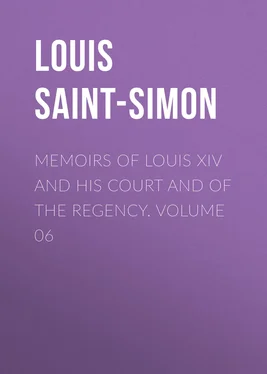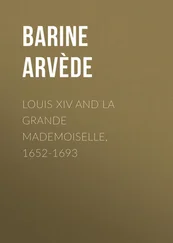At last, however, no longer hoping to see his actress, he not only consented, but wished to marry. His parents were delighted at this, and at once looked about for a wife for him. Their choice, fell upon the eldest daughter of the Duc de Roquelaure, who, although humpbacked and extremely ugly, she was to be very rich some day, and was, in fact, a very good match. The affair had been arranged and concluded up to a certain point, when all was broken off, in consequence of the haughty obstinacy with which the Duchesse de Roquelaure demanded a larger sum with M. de Leon than M. de Rohan chose to give.
The young couple were in despair: M. de Leon, lest his father should always act in this way, as an excuse for giving him nothing; the young lady, because she, feared she should rot in a convent, through the avarice of her mother, and never marry. She was more than twenty-four years, of age; he was more than eight-and-twenty. She was in the convent of the Daughters of the Cross in the Faubourg Saint Antoine.
As soon as M. de Leon learnt that the marriage was broken off, he hastened to the convent; and told all to Mademoiselle de Roquelaure; played the passionate, the despairing; said that if they waited for their parents' consent they would never marry; and that she would rot in her convent. He proposed, therefore, that, in spite of their parents, they should marry and be their own guardians. She agreed to this project; and he went away in order to execute it.
One of the most intimate friends of Madame de Roquelaure was Madame de la Vieuville, and she was the only person (excepting Madame de Roquelaure herself) to whom the Superior of the convent had permission to confide Mademoiselle de Roquelaure. Madame de la Vieuville often came to see Mademoiselle de Roquelaure to take her out, and sometimes sent for her. M. de Leon was made acquainted with this, and took his measures accordingly. He procured a coach of the same size, shape, and fittings as that of Madame de la Vieuville, with her arms upon it, and with three servants in her livery; he counterfeited a letter in her handwriting and with her seal, and sent this coach with a lackey well instructed to carry the letter to the convent, on Tuesday morning, the 29th of May, at the hour Madame de la Vieuville was accustomed to send for her.
Mademoiselle de Roquelaure, who had been let into the scheme, carried the letter to the Superior of the convent, and said Madame de la Vieuville had sent for her. Had the Superior any message to send?
The Superior, accustomed to these invitations; did not even look at the letter, but gave her consent at once. Mademoiselle de Roquelaure, accompanied solely by her governess, left the convent immediately, and entered the coach, which drove off directly. At the first turning it stopped, and the Prince de Leon, who had been in waiting, jumped-in. The governess at this began to cry out with all her might; but at the very first sound M. de Leon thrust a handkerchief into her mouth and stifled the noise. The coachman meanwhile lashed his horses, and the vehicle went off at full speed to Bruyeres near Menilmontant, the country-house of the Duc de Lorges, my brother-in-law, and friend of the Prince de Leon, and who, with the Comte de Rieux, awaited the runaway pair.
An interdicted and wandering priest was in waiting, and as soon as they arrived married them. My brother-in-law then led these nice young people into a fine chamber, where they were undressed, put to bed, and left alone for two or three hours. A good meal was then given to them, after which the bride was put into the coach, with her attendant, who was in despair, and driven back to the convent.
Mademoiselle de Roquelaure at once went deliberately to the Superior, told her all that happened, and then calmly went into her chamber, and wrote a fine letter to her mother, giving her an account of her marriage, and asking for pardon; the Superior of the convent, the attendants, and all the household being, meanwhile, in the utmost emotion at what had occurred.
The rage of the Duchesse de Roquelaure at this incident may be imagined. In her first unreasoning fury, she went to Madame de la Vieuville, who, all in ignorance of what had happened, was utterly at a loss to understand her stormy and insulting reproaches. At last Madame de Roquelaure saw that her friend was innocent of all connection with the matter; and turned the current of her wrath upon M. de Leon, against whom she felt the more indignant, inasmuch as he had treated her with much respect and attention since the rupture, and had thus, to some extent, gained her heart. Against her daughter she was also indignant, not only for what she had done, but because she had exhibited much gaiety and freedom of spirit at the marriage repast, and had diverted the company by some songs.
Конец ознакомительного фрагмента.
Текст предоставлен ООО «ЛитРес».
Прочитайте эту книгу целиком, на ЛитРес.
Безопасно оплатить книгу можно банковской картой Visa, MasterCard, Maestro, со счета мобильного телефона, с платежного терминала, в салоне МТС или Связной, через PayPal, WebMoney, Яндекс.Деньги, QIWI Кошелек, бонусными картами или другим удобным Вам способом.












